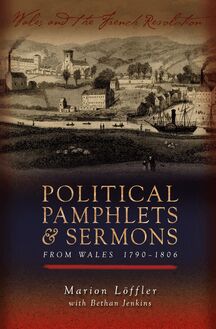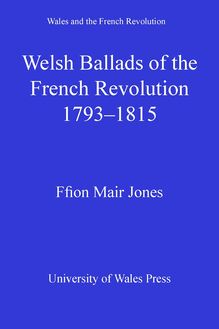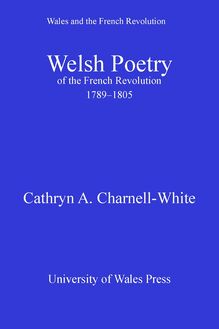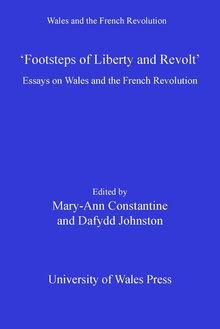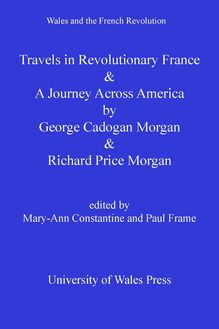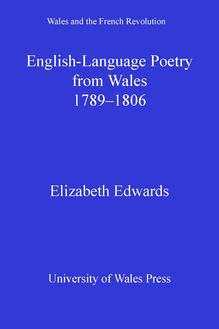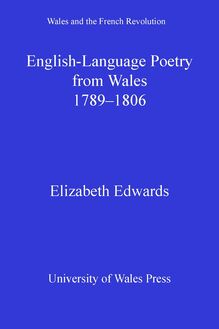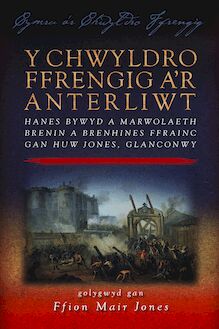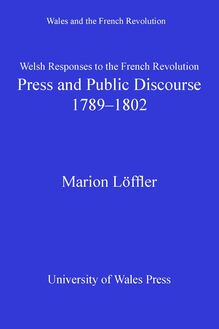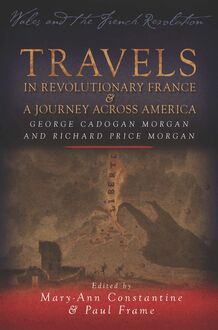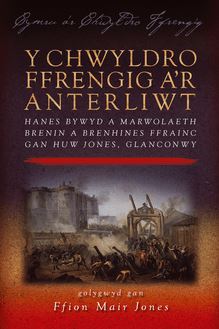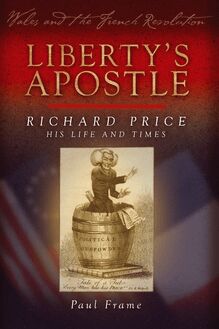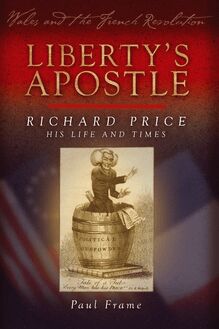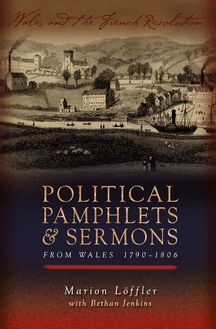-
 Univers
Univers
-
 Ebooks
Ebooks
-
 Livres audio
Livres audio
-
 Presse
Presse
-
 Podcasts
Podcasts
-
 BD
BD
-
 Documents
Documents
-
- Cours
- Révisions
- Ressources pédagogiques
- Sciences de l’éducation
- Manuels scolaires
- Langues
- Travaux de classe
- Annales de BEP
- Etudes supérieures
- Maternelle et primaire
- Fiches de lecture
- Orientation scolaire
- Méthodologie
- Corrigés de devoir
- Annales d’examens et concours
- Annales du bac
- Annales du brevet
- Rapports de stage
La lecture à portée de main
Vous pourrez modifier la taille du texte de cet ouvrage
Découvre YouScribe en t'inscrivant gratuitement
Je m'inscrisEnglish-language Poetry from Wales 1789-1806 , livre ebook
Découvre YouScribe en t'inscrivant gratuitement
Je m'inscrisEn savoir plus
Vous pourrez modifier la taille du texte de cet ouvrage
En savoir plus

Description
Sujets
Informations
| Publié par | University of Wales Press |
| Date de parution | 15 février 2013 |
| Nombre de lectures | 0 |
| EAN13 | 9780708326930 |
| Langue | English |
| Poids de l'ouvrage | 2 Mo |
Informations légales : prix de location à la page 0,0450€. Cette information est donnée uniquement à titre indicatif conformément à la législation en vigueur.
Extrait
WALES AND THE FRENCH REVOLUTION
General Editors: Mary-Ann Constantine and Dafydd Johnston
For Matthew, Rufus and Jemima
English-Language Poetry from Wales 1789–1806
ELIZABETH EDWARDS
UNIVERSITY OF WALES PRESS CARDIFF 2013
-->
© Elizabeth Edwards, 2013
All rights reserved. No part of this book may be reproduced in any material form (including photocopying or storing it in any medium by electronic means and whether or not transiently or incidentally to some other use of this publication) without the written permission of the copyright owner except in accordance with the provisions of the Copyright, Designs and Patents Act 1988. Applications for the copyright owner’s written permission to reproduce any part of this publication should be addressed to The University of Wales Press, 10 Columbus Walk, Brigantine Place, Cardiff CF10 4UP.
www.uwp.co.uk
British Library Cataloguing-in-Publication Data A catalogue record for this book is available from the British Library.
ISBN 978-0-7083-2568-1 e-ISBN 978-0-7083-2693-0
The right of Elizabeth Edwards to be identified as author of this work has been asserted by her in accordance with sections 77, 78 and 79 of the Copyright, Designs and Patents Act 1988.
Typeset in Wales by Eira Fenn Gaunt Printed CPI Antony Rowe, Chippenham, Wiltshire
‘one of these excursions, travelling … [t]hrough Wales’
William Wordsworth, The Prelude , Book XIII.
WALES AND THE FRENCH REVOLUTION
The French Revolution of 1789 was perhaps the defining event of the Romantic period in Europe. It unsettled not only the ordering of society but language and thought itself: its effects were profoundly cultural, and they were long-lasting. The last twenty years have radically altered our understanding of the impact of the Revolution and its aftermath on British culture. In literature, as critical attention has shifted from a handful of major poets to the non-canonical edges, we can now see how the works of women writers, self-educated authors, radical pamphleteers, prophets and loyalist propagandists both shaped and were shaped by the language and ideas of the period. Yet surprising gaps remain, and even recent studies of the ‘British’ reaction to the Revolution remain poorly informed about responses from the regions. In literary and historical discussions of the so-called ‘four nations’ of Britain, Wales has been virtually invisible; many researchers working in this period are unaware of the kinds of sources available for comparative study.
The Wales and the French Revolution Series is the product of a four-year project funded by the AHRC and the University of Wales at the Centre for Advanced Welsh and Celtic Studies. It makes available a wide range of Welsh material from the decades spanning the Revolution and the subsequent wars with France. Each volume, edited by an expert in the field, presents a collection of texts (including, where relevant, translations) from a particular genre with a critical essay situating the material in its historical and literary context. A great deal of material is published here for the first time, and all kinds of genres are explored. From ballads and pamphlets to personal letters and prize-winning poems, essays, journals, sermons, songs and satires, the range of texts covered by this series is a stimulating reflection of the political and cultural complexity of the time. We hope these volumes will encourage scholars and students of Welsh history and literature to rediscover this fascinating period, and will offer ample comparative scope for those working further afield.
Mary-Ann Constantine and Dafydd Johnston General Editors
Contents
List of Figures
Preface
Acknowledgements
List of Abbreviations
Introduction
Texts
Editorial Principles
1. David Samwell (Dafydd Ddu Feddyg), ‘Ode for the New Year MDCC,XC. As it was intended to have been rehearsed this Day at St. JAMES’s’
2. William Sotheby, ‘A Tour Through Parts of South and North Wales’ (extract)
3. Anon., ‘An Ode to Commerce. Inscribed to John Wilkinson, Esq. the distinguished iron master’
4. Richard Llwyd, ‘An Ode for the New Year [1791], Inscribed to Paul Panton, of Plasgwyn, Esq.’
5. Richard Llwyd, ‘Ode, for the Anniversary of St. David [1792]’
6. David Thomas (Dafydd Ddu Eryri), ‘The Banks of the Menai. An Ode’
7. David Samwell (Dafydd Ddu Feddyg), ‘The Resurrection of Rhitta Gawr’
8. George Richards, ‘The Captivity of Caractacus’ (extract)
9. William Sotheby, ‘Llangollen. Written at the close of the Autumn 1792’ (extract)
10. Edward Williams (Iolo Morganwg), ‘Winter Incidents, Written in 1777’
11. Edward Williams (Iolo Morganwg), ‘Solitude. From the Welsh. Written in 1789’
12. Edward Williams (Iolo Morganwg), ‘Ode; Imitated from the Gododin of Aneurin, an ancient British Bard, who wrote about the Year 550’
13. Edward Williams (Iolo Morganwg), ‘ ADDRESS TO THE INHABITANTS OF WALES . Exhorting them to emigrate, with WILLIAM PENN, to Pennsylvania’ (extract)
14. Edward Williams (Iolo Morganwg), ‘The Horrors of War, a Pastoral’
15. Edward Williams (Iolo Morganwg), ‘Ode on Converting a Sword into a Pruning Hook’
16. Jane Cave, ‘THOUGHTS O N THE PRESENT TIMES; Written some Time after the PROCLAMATION for the late General FAST’
17. Hester Piozzi, Untitled [‘Can impious France, though frantic grown’]
18. Edward Williams (Iolo Morganwg), ‘Church and King rampant or Satan let loose for a thousand years’
19. Edward Williams (Iolo Morganwg), ‘John Bull’s Litany’
20. Joseph Hucks, ‘On the Ruins of Denbigh Castle, in North Wales’
21. Edward Williams (Iolo Morganwg), ‘Song. Bella! horrida Bella! Written in Nov r 1794’
22. David Samwell (Dafydd Ddu Feddyg), ‘Ode, Written on a long and uncommonly tempestuous cruise with a Squadron of Men of War in about 63˚ North Latitude, Dec r 24 1794’
23. Hester Piozzi, ‘See, see the mad Marauders come!’
24. Edward Williams (Iolo Morganwg), ‘Newgate Stanzas’
25. Edward Williams (Iolo Morganwg), ‘TRIAL BY JURY, The Grand Palladium of B RITISH L IBERTY ’
26. Anon., ‘For the Chester Chronicle’
27. Thomas Ryder, ‘Introductory Ode for the Cambrian Register’
28. ‘Eliza’, ‘Sketched on a Party down the River Wye, from Ross to Monmouth’
29. Anna Seward, ‘Llangollen Vale, Inscribed to the Right Honourable Lady Eleanor Butler, and Miss Ponsonby’ (extract)
30. Anon., ‘The False Alarm’
31. Cæsar Morgan, ‘The Victory of Fishguard. A favorite Song’
32. Hester Piozzi, ‘Written on the Spur of the Moment, to be Sung at the Crown and Anchor’
33. Edward Williams (Iolo Morganwg), ‘Song for the Glamorgan Volunteers’
34. Robert Southey, ‘St. David’s Day [1797]’
35. Robert Southey, ‘Lines, Written Amid the Ruins of Abergavenny Castle’
36. Robert Southey, ‘Ode’ [‘In vain the trav’ller seeks Aberffraw’s tow’rs’]
37. David Thomas (Dafydd Ddu Eryri), ‘Verses written on the late Victory gained over the French Squadron by Sir John Borlase Warren’
38. ‘A Lady’, ‘Bangor Ferry’
39. Richard Llwyd, Beaumaris Bay. A Poem (extract)
40. Edward Williams (Iolo Morganwg), ‘Carmen Seculare, or Jubilant Song for the year 1800 1900’
41. George Davies Harley, ‘Sonnet II: Penman-Mawr’
42. George Davies Harley, ‘Sonnet III: On Seeing a Poor Welch Girl Pass My Window in a Storm’
43. George Davies Harley, ‘Sonnet IX: The Peasant of Anglesea’
44. Anon., ‘The Widow’
45. Richard Llwyd, ‘The Address of the Bard of Snowdon, to his Countrymen, Written in June, 1803, During the Threats of Invasion’
46. Robert Holland Price, The Horrors of Invasion; A Poem
47. Joseph Reade, Invasion! A Poem (extract)
48. ‘Britannus’, ‘To Bonaparte’
49. T. Ellis Owen, ‘Anglesey Volunteer Song’
50. Richard Llwyd, ‘Awdl y Misoedd / Ode of the Months’
51. Richard Llwyd, ‘Owen of Llangoed. Founded on fact. To Fleetwood Williams, Esq. of Liverpool’
52. ‘Breconiensis’, ‘The Saxon Invasion’
53. ‘Philopatria’, Untitled [‘Arise, my muse, and paint the glorious scene’]
54. ‘Mary’, ‘On the Late Splendid Victory off Trafalgar’
55. ‘P. H.’, ‘On the Victory of Cape Trafalgar, and the Death of the ever-to-be-lamented Admiral Lord Viscount Nelson’
56. ‘J. H.’, ‘On Winter’
57. ‘W. R.’, ‘On the Death of Mr. Pitt’
58. David Thomas (Dafydd Ddu Eryri), ‘An Address to the Snowdon Rangers’
59. ‘Mary’, ‘Written late in the Evening, December 15, 1806’
60. ‘D.’, ‘On the Present State of the Belligerent Powers of Europe’
Notes to the Texts
Select Bibliography
Figures
Fig. 1 S. Alken, after J. Smith, ‘Caraig-cennin Castle’ (1794)
Fig. 2 Extract from Edward Williams (Iolo Morganwg), ‘Church and King rampant or Satan let loose for a thousand years’ (NLW 21401E, f. 6)
Fig. 3 J. M. W. Turner, ‘Dinas Bran, with the Dee in the Foreground’ (1798)
Fig. 4 John Hill, after Henry Wigstead, ‘Penmanmawr’ (1799)
Preface
This anthology aims to introduce a wide-ranging but representative selection of Anglophone Welsh poetry from the period 1789–1806. Pulled together for the first time – in some cases published for the first time – this body of writing creates a new poetic map of Wales that unfolds over a decade and a half of revolution and war. My introduction points out contexts for the poems and connections between them, but necessarily selective due to limitations of space, it also leaves the reader to take their own route through the texts, and to make their own links with other works not discussed in this anthology but which should suggest themselves time and again. I hope that this selection of texts, which contains many overlooked or hard-to-find items, may encourage excursions into less familiar writings about Wales, a nation that emerges here as a Romantic-era melting pot: heroic but subdued, defiant but suffering, beautiful, hostile, mysterious and inspiring, constantly reimagined and endlessly marginalized.
Viewed collectively the texts present several difficulties of interpretation. There is little uniformity of sty
-
 Univers
Univers
-
 Ebooks
Ebooks
-
 Livres audio
Livres audio
-
 Presse
Presse
-
 Podcasts
Podcasts
-
 BD
BD
-
 Documents
Documents
-
Jeunesse
-
Littérature
-
Ressources professionnelles
-
Santé et bien-être
-
Savoirs
-
Education
-
Loisirs et hobbies
-
Art, musique et cinéma
-
Actualité et débat de société
-
Jeunesse
-
Littérature
-
Ressources professionnelles
-
Santé et bien-être
-
Savoirs
-
Education
-
Loisirs et hobbies
-
Art, musique et cinéma
-
Actualité et débat de société
-
Actualités
-
Lifestyle
-
Presse jeunesse
-
Presse professionnelle
-
Pratique
-
Presse sportive
-
Presse internationale
-
Culture & Médias
-
Action et Aventures
-
Science-fiction et Fantasy
-
Société
-
Jeunesse
-
Littérature
-
Ressources professionnelles
-
Santé et bien-être
-
Savoirs
-
Education
-
Loisirs et hobbies
-
Art, musique et cinéma
-
Actualité et débat de société
- Cours
- Révisions
- Ressources pédagogiques
- Sciences de l’éducation
- Manuels scolaires
- Langues
- Travaux de classe
- Annales de BEP
- Etudes supérieures
- Maternelle et primaire
- Fiches de lecture
- Orientation scolaire
- Méthodologie
- Corrigés de devoir
- Annales d’examens et concours
- Annales du bac
- Annales du brevet
- Rapports de stage
